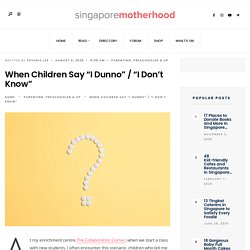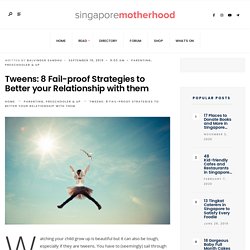Influencing behaviour of teenagers with reinforcement and punishment
> Jasmine_chew
Are your teenagers starting to act up? Not sure how to influence their behaviours?
Using the various type of reinforcements and punishments, we will be able to influence different behaviours of teenagers as they are growing up.
We will be exploring what is reinforcement and punishment, followed by how can parents use this to influence the different behaviours of their teenagers at home.
What is Reinforcement and Punishment?
What is Operant Conditioning?
Reinforcement. Positive vs Negative Reinforcement in ONE Minute. Punishment. Difference Between Positive and Negative Punishment. Summary of Reinforcement and Punishment. What is Positive Reinforcement?
Positive Reinforcement. What is Negative Reinforcement?
Negative Reinforcement.
Fixed and Variable Interval Schedule. Fixed and Interval Ratio Schedules. Learning: Schedules of Reinforcement. Summay of Four Main Reinforcement Schedules. What is Positive Punishment?
Positive Punishment. What is Negative Punishent?
Negative Punishment. Positive Reinforcement - Tips for teaching and parenting. “COVID-19 Sent My Family’s Screen Time Sky High. Why Aren’t Your Kids Addicted?” - SingaporeMotherhood.com. When a fellow mum asked me this, I had to chuckle.

It’s not that my kids wouldn’t be stuck to their screens too… if I just let them. It simply takes a little bit of work to ensure screen time doesn’t take over our lives. From Day One We set clear parameters around screen time from an early age. That culture includes inculcating the habits of: asking before they use any digital device, or even watch TV,earning their screen time, andhanding over to them the responsibility of monitoring their own usage. (See also: Best Parental Control Apps for Your Child’s Smartphone) Which means that as the parent, all I had left to do was to: confirm that each child has completed their responsibilities for the day (homework, chores, etc), thenallow a (pre-agreed upon) specific duration (usually about 20 minutes) of screen time, andenforce that each earns their own screen time.
The consequences of watching any screen without adhering to SOP (standard operating procedures) are simple. Then COVID-19 Happened 1.
Comments on “COVID-19 Sent My Family’s Screen Time Sky High. Why Aren’t Your Kids Addicted?” - SingaporeMotherhood.com. Parent-child connection crucial to well-being of young, Letters on the Web News. We are deeply concerned that the number of suicides for male teenagers aged 10 to 19 hit a record high last year (Record 19 teenage boys committed suicide last year, July 30). Research has shown that young people with a strong and close relationship with their parents are more likely to also report lower levels of depressive symptoms, suicide thoughts, self-harm and conduct problems. Such youth were more likely to report higher levels of self-esteem and better use of their free time. Connectedness to parents has been found to be especially important for the well-being of the young. Parents, therefore, play a crucial role in protecting adolescents against the risk of suicide when they invest time and effort to build a stronger relationship with their teenagers.
One way they can do this is to equip themselves with parenting books or attend parenting workshops. When it comes to boys, parents can help their sons with their ability to regulate their emotions. Raphael Zhang Family Life Specialist. Comments on Parent-child connection crucial to well-being of young. When Children Say “I Dunno” / "I Don't Know" - SingaporeMotherhood.com.
At my enrichment centre The Collaboration Corner, when we start a class with new students, I often encounter this scenario: children who tell me “I dunno / I don’t know” to almost every single question I ask them… These below are just the tip of the iceberg.

Real Case Example 1:Dr. Pet: Would you like to run up and down my stairs five times to work up a sweat?
Child: *shrug* I dunno. Real Case Example 2:Dr.
Tweens: 8 Fail-proof Strategies to Better your Relationship with them - SingaporeMotherhood.com. Watching your child grow up is beautiful but it can also be tough, especially if they are tweens.

You have to (seemingly) sail through the changes that they go through – emo phases, mood swings, and puberty. You also have to ensure that your tween (aged 9-12 years) has the right values instilled, so that they will be less likely to go astray when they are teenagers. But as tweens grapple with physical, emotional, and social changes, your once-needy child might not want to have anything to do with you. That hurts. Still, bear in mind: while this might be difficult for you, it seems overwhelming for them. “My talkative daughter started getting moody around age 11,” says Shanti Menon. Sounds familiar?
References.



